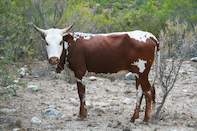Cattle production is deeply rooted in the culture of many South African societies, as cattle were historically seen as a sign of power and wealth because of their huge contribution to household food security through milk and meat production.

But cattle also had other major advantages, they helped to work the lands and carry heavy loads as draught animals and they provide many valuable by-products, such as leather for clothing, horns for containers and manure to be used as fuel and fertiliser sources as well as the plastering of walls and floors.
Cattle was also used to calculate bride wealth, a payment, called lobola, which had to be made to the head of the family of a bride as a way to strengthen ties between the respective families.
Even though they might no longer own cattle, many members of these societies still follow this tradition today, with the value of the financial contribution being linked to the price of cattle.